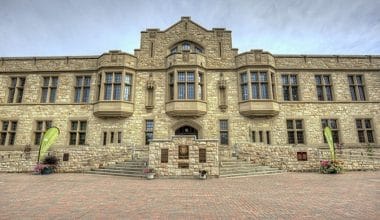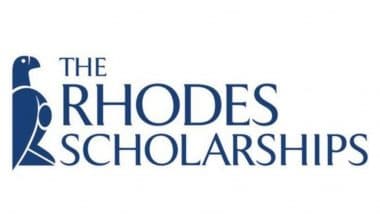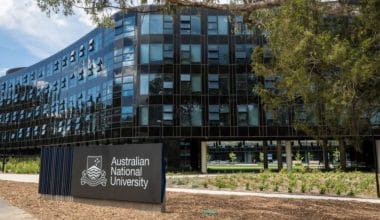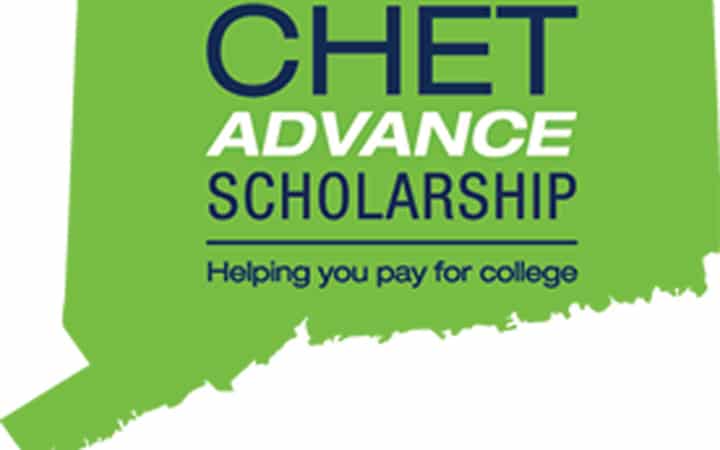Canada is becoming a popular option for students who seek to study internationally. To make it even more interesting, Canadian universities are now providing equally prestigious degrees as those in the US. What more can a student ask for?
These schools offer some of the world’s best study programs and are home to some of the world’s leading research facilities and academic institutions.
If studying abroad is your plan, Canada should be at the top of your list. We have put together a complete guide to study in Canada for international students. Read through to get the most of this publication.
Considering that it’s the second-largest country in the world by land area, there’s plenty to explore in Canada.
Bordered by the United States to the south, the Pacific Ocean on the west, the Atlantic Ocean to the east, and the Arctic Ocean to the north, Canada has a unique location that offers some stunning views, extreme weather, and unlimited things to discover. These are just a few of the reasons that students love studying abroad in Canada!.
Education System In Canada
Canada prides itself on being a world-leader in research while still remaining accessible and diverse.
Unlike other higher education systems, Canadian degree programs are flexible. No matter what degree you pursue, students are given some choice when it comes to picking classes.
Canadian students have more control over their workload and what subjects they will study, depending on the discipline.
Furthermore, education in Canada is available in both English and in French in most places, provided there are enough students in that area speaking the secondary language.
High school is typical until grades nine to 12. In Québec, high school ends in grade eleven and is followed by a program that prepares the student for university or a technical field called CEGEP.
Beyond this, students can attend either vocational schools or enter a university. At a university, they will first earn a Bachelor’s degree and can continue studies to receive a Master’s or a Doctorate degree. Vocational students will earn certificates and diplomas that will help improve their skills in various trades.
Popular student destinations:
Universities like McGill University, The University of British Columbia, University of Alberta and Simon Fraser University are popular choices if you want to pursue a full-time academic degree. Most of the best colleges in the country are situated in cities like Toronto, British Columbia, Montreal.
The number of Canadian student visas issued to Indian students jumped to more than 12,000 in 2010, from 3,152 in 2008.
Canada is the preferred destination for vocational studies rather than degree courses as the former seems to provide more employment opportunities. Canada is a good choice for immigration as the country offers immense scope for work owing to its low population density.
The most popular higher study courses in Canada would be postgraduate diplomas in areas like Business Management, Media, Engineering, Computer Science, and Hospitality.
Safety in Canada:
Canada is one of the safest countries, with one of the highest standards of living in the world. Canada is a free country where people are, by and large, judged on their actions and character, rather than their appearance or country of origin.
Weather
Weather in Canada varies widely depending on where you are. Canada stretches from the Pacific to the Atlantic Ocean, covering five time zones.
Montreal Weather – The weather here in winter is cold and snowy. The cold in Montreal can be especially biting because of the wind-chill factor. Snowfall usually begins in November and continues through March. During winter months, the daytime temperatures are between -6°C to -15°C. Summer temperatures range from 15°C to 25°C.
Toronto Weather – The weather here in winter is milder than most Canadian cities, yet still cold and snowy. Summer temperatures range from 15°C to 25°C. During winter months, the daytime temperatures are between -10°C to 12°C.
Vancouver Weather – It remains wet, yet mild throughout the year. Summer in Vancouver is pleasantly warm with an average temperature of 22°C. Winters are wet, but snow is rare. Average daily temperatures in winters range from 3°C to 7°C.
Lifestyle tips
Canadians are known to be open-minded and proud of their multicultural and diverse population. Like any other country, Canadians have certain expectations of behavior. Here are a few tips:
- Be on time for both professional and social occasions
- Be respectful in conversation and behavior
- Canadians believe in equality between genders, so show respect to the opposite sex
- Don’t crack jokes or make comments that are insulting to people’s race, religion, gender, disability, sexual orientation or appearance
- Avoid personal questions about things like age, salary, marital status, relationships, and the cost of personal items until you are well-acquainted with people
Language problems: Living in a society where you have to use English or occasionally French on a daily basis can be challenging at first. Some language problems you may initially encounter when you arrive are:
- You may not understand the local accent right away. Regional accents vary greatly in Canada. Give yourself time to get used to the local accent.
- Canadians might not understand you right away. You will also have your own accent. Speak slowly and don’t be shy about asking others to speak slowly if you are having a hard time understanding them.
- Canadians use a lot of slang in their speech and it might take you some time before you understand all of it.
- Humour is an integral part of Canadian English. This should be interpreted as a sign of friendliness, not disrespect.
- Canadians use lots of abbreviations in their speech (for example, TA for Teachers Assistant or Poli Sci for Political Science). If you don’t understand something, simply ask the meaning of it.
Participation: It is necessary to participate in all activities during your classes. You may be asked to participate in class discussions, group work or other activities. It is very important to participate outside of the classroom as well. This will provide you with many opportunities to practice your English skills in many different settings.
Making friends: Try not to be shy. Remember that making friends is important to everyone in their first year of university. Saying “please” and “thank you” are important Canadian customs, and your relationships will improve if you express your gratitude and appreciation to those around you.
Accommodation
Firstly, you need to decide whether you want to live in university-managed accommodation, or with a private landlord. Choosing university-managed accommodation can also give you a catered or self-catered option. Catered accommodation offers the benefits of your meals being cooked for you and a degree of certainty with meal costs.
If you have an idea about what you prefer, the accommodation office at your university will be able to tell you what accommodation they have available – so that’s the place to start. If you are thinking of renting from a private landlord or if your chosen university can’t offer you anything in its own residential facility, the accommodation office should be able to provide you with a list of private properties and landlords in the area.
Wherever you choose to live, you should make sure that you know your contractual rights and responsibilities. In most cases, you will be asked to enter into a tenancy agreement, which you should read thoroughly before you sign it.
Orientation
Orientation week is mandatory for international students so you want to be sure and arrive before it starts. This is the time where you will be introduced to the university and its services, as well as enroll in your classes. It is essential that you read your guidebook, which is provided by the college. The guide explains each part of the admission process.
Activities
Along with sports, colleges offer extra-curricular activities that provide students a wide range of experiences. Music, drama, science and literary societies in colleges offer opportunities for outdoor education and other leisure activities. Visits to theatres and concerts, and to places relevant to the courses of study such as art galleries and museums, religious centers or historical sites, scientific companies and projects are all part of college life.
Admission process
Requirements
These vary between study programs and levels. For each course, Indian students will need to meet a minimum English language requirement. Along with that a minimum academic record of 65% and above for humanities stream in class XII, and 70 – 80% and above for Science/Commerce stream in class XII will also be required. Foundations and Diploma programs are available for students who have secured below 60%. The student should have completed 18 years of age before joining a degree program.
It is important to note that these numbers are just for reference purpose, the actual numbers may differ from university to university.
Documents
The following documents also need to be submitted –
- Attested copies of mark sheets of Standard X, XII, and the Bachelor’s degree (if applicable)
- At least, two academic reference letters from professors who have taught you most recently
- If you have work experience then two letters of recommendation from the employer/manager who knows you well and can comment on your professional abilities
- Statement of Purpose (SOP)
- Resume
- Photocopied score reports of GMAT / IELTS / TOEFL
- Portfolio (in case of Students applying for art and design courses & architecture programs)
- Others (certificates/achievements at the state and national level and extracurricular activities)
- Proof of funds
- Medical Tests
Check which Documents are required for Diploma Courses in Canada
Timeline
Most Canadian colleges accept online applications. You will have to visit each college’s website to apply. In most cases, you will have to make an account on the college website to provide your basic information, submit the scanned version of your documents, and pay application fees. You will be informed about the application process and stages through this account.
Please refer to the website of the colleges of your choice to know the process of applying as it may differ from institute to institute.
Application fee
All colleges require that you pay an application fee while applying. The fee amount will differ depending upon the college and course being applied to, so check with individual colleges about their application fee.
Steps: The common steps to applying for admission are as follow –
- Search for colleges and courses
- Contact schools and visit websites for information
- Narrow down your list of schools
- Take the entrance exams like SAT, GMAT, GRE, TOEFL, IELTS
- Write SOPs and ask for LORs
- Apply to the colleges which fit your interests
- Appear for video interviews of the colleges that shortlisted you
- If accepted, apply for the student visa
Intake seasons
The session starts mainly in September and January but some institutions have intakes in May, July, and October as well. The Major intake season for the top courses in Canada is September, while the minor intake season in January, which is meant for a fairly small number of courses.
You should start your admission process around six months before the application deadline. Typically most universities have three deadlines, from October to January. It is up to the convenience of the students, which deadline to aim for. You should be done with your language and aptitude tests by three months before the deadline. The last three months should be dedicated to filling out the application form properly.
It is essential to ensure that the ‘complete application process’ along with appearing for interviews and visa application procedure should be complete by June or July for the September intake.
The main intake season for top colleges and courses in the fall season i.e. September. It depends on what course you are looking to pursue because many courses don’t have the January intakes.
If you are looking to get admission into vocational courses, then some courses may have admissions open in January and perhaps even May or July.
Language exams
The International English Language Testing System (IELTS), Test of English as a Foreign Language (TOEFL) and Pearson Test of English (PTE) are all standardized language tests, which are required to be taken for the purpose of getting admission into colleges.
These follow different formats, structure and result bands. These tests are all different in various ways but many colleges ask for anyone of the results. So it’s up to the student to decide which exam to appear for.
Repetition of exams: IELTS can be taken the unlimited number of times. TOEFL can be retaken as many times as desired, but cannot be taken more than once in a 12-day period. Same holds true for PTE; it can be taken as many times as one wishes to. You must wait to receive your scores before you can book your next test.
Fee: The fee for these exams is Rs 9,300 for IELTS, Rs 10,000 for TOEFL and Rs 9,350 for PTE.
Time to apply: Ideally, if you are aiming at the September intake you should appear for these exams by November so that you can apply before the 1st deadline. The universities you will be applying to will mention which exam results they will accept. But if they give a choice to go for either of these, then the choice depends on you. The time required to prepare for IELTS/TOEFL/PTE would depend on the existing English language proficiency. You may require 2 to 4 months of preparation before the exam date.
General exams
GMAT – The Graduate Management Aptitude Test is used to measure the abilities of the potential MBA aspirant to undertake higher education in the field of business or management. It measures the mathematical, English, and reasoning skills of the student.
GRE – The Graduate Record Examination is another test required to be taken by students applying to graduate schools to pursue MA or MS. Increasingly, many business schools are also accepting GRE scores for the purpose to granting admission for MBA.
LSAT – The Law School Admission Test is a standardized test and is an integral part of the law school admission process. It provides a measure of reading and verbal reasoning skills that law schools can use in assessing applicants.
SAT – The Scholastic Assessment Test measures literacy and writing skills that are needed for academic success in college. This test assesses how well the test takers analyze and solve problems-skills they learned in school that they will need in college. SAT is typically taken by high school students to get into undergraduate courses.
Exams required to pursue vocational courses in Canada
The university you will be applying to will mention which exam results will be applicable for the course of your choice. But if they give a choice to go for either of these, then the choice depends on you.
Repetition and Fee: You can give GMAT an unlimited number of times, subject to five times a year and a gap of 30 days between two tests. You can take these tests with a gap of 30 days from the first time. The cost of GMAT is Rs 16,000, GRE is Rs 12,000 and LSAT is Rs 3,800.
Ideally, if you are aiming at the September intake you should appear for these exams by November so that you can apply before the 1st deadline. The preparatory duration generally ranges from 4 to 6 months.
Average Scores: The average GMAT score accepted across universities is 540. The average GRE score is 151 for Verbal, 146 for Quantitative and 3.5 for Writing. Average LSAT score accepted across universities is 162.
It is important to note that these numbers are just for reference purpose, the actual scores may differ from university to university.
Cost of living In Canada
The cost of living depends heavily on what part of Canada will you be living in along with how much you will socialize. Some of the basic elements for living as an international student in Canada are:
- Accommodation rent ( on campus or off campus )
- Groceries and food
- Utilities like electricity, water, gas, internet
- Phone bills
- Text and reference books
- Airfare for traveling back to India
Other elements which may differ from person to person would be:
- Dining out
- Travel and Vacation
- Car rent and Car insurance
- Cable TV connection
School expenses
The tuition fee varies according to different universities, courses, and the city. The tuition expenses in Canada might be up to CDN $10,000 – $30,000 per year for an undergraduate course. And if you are thinking of applying to a postgraduate course, the cost would be $15,000 – $55,000 per year approximately.
Living expenses
On average, a student spends approximately CDN $10,000–$12,000 per year. But the expenses also depend on the place where a student stays. If a student stays in metropolitan cities like Toronto or Vancouver the expenses could go up to CDN $15,000 in comparison to a student studying in the suburbs where the expenses would be around CDN $8,000-$10,000 each year.
Health insurance
Insurance Policy for international students is mandatory, as students have to stay abroad for a long period of time. Before getting an insurance policy make sure that it covers medical expenses, personal accident, dental treatment, study interruption, passport loss, etc. Insurance is basically cashless so a student does not need to pay money at the time of hospitalization.
SEE ALSO: 13 Best School of Nursing in Canada 2024 | Rankings
Scholarships for Canadian Students
Merit and need-based fee waivers are awarded to international students. Candidate with strong academics, good performance in standardized exams and extracurricular achievements would be eligible for scholarship awards and financial assistance.
To benefit from these opportunities, one has to make sure to send all the required documents by particular deadlines. In addition to this, the presentation of the application is also important because one is judged by the image one projects.
Documents required: The documents usually needed for a scholarship application are as follow, although the requirements may differ:
- Academic records and photocopies
- A recent CV
- A letter of intent, which acts as a cover page
- Certificate of language proficiency (TOEFL or IELTS scores)
- Letters of Reference (LOR)
Loans
Student eligibility criteria: The first thing is to be aware of whether you are eligible to apply for the loan or not. The general eligibility criteria that are followed by all the banks are:
- You should be an Indian national
- You must have a strong academic record
- Must be seeking admission to professional, technical or other courses of study. Most banks maintain that the selected course should be job oriented.
- You must have secured admission to foreign University Institutions.
- You must be above the age of 18 years or else your parents can avail of the loan.
Eligibility of course:
You may not get a loan on every course. Here are the kinds of courses that qualify for the education loan:
- For Graduation: Job oriented professional or technical courses offered by reputed universities
- For Post Graduation: MCA, MBA, MS or even diplomas
- These courses could be from foreign universities or institutes approved by the state and central government.
Conditions
You should apply for the student visa after you get the college acceptance letter. You should begin with the visa process around June if aiming at the September intake. The following are the documents needed to apply.
- Proof of acceptance: If you plan to attend any school (primary or secondary), college, university or other educational institution in Canada, the school must complete and send you a letter of acceptance. You must include the original letter with your study permit application.
- Proof of financial support: You must prove that you can support yourself and the family members who accompany you while you are in Canada.
Note: Additional documentation may be required.
During the personal interview, additional documents may be requested by the interviewer. These may be documents to prove evidence of academic or financial status. These may include:
- Transcripts, diplomas, degrees, or certificates from schools you attended
- Scores from tests, such as the TOEFL, SAT, GRE, or GMAT
- Your intent to depart from Canada upon completion of the course of study
- How you will pay all educational, living and travel costs
How to apply for Canadian Visa
Check the processing times: The visa application cycle might take anywhere from 3-4 weeks. It is advisable to go through the Canadian consulate website to know the approximate time taken to process the student visa. Please note that the time shown is not a guarantee and is just an estimate.
Determine how you will apply. There are two ways to apply:
Apply online
To apply online you must have access to a scanner or camera to create electronic copies of your documents for uploading and have a valid credit card for payment. You will still be required to provide a finger scan at the regional Visa Application Centre (VAC).
Apply in person
Download the application kit and read the instruction guide. The instruction guide contains important information about study permits and instructions to help you complete your application. Read the guide carefully and use the document checklist.
Pay the processing fee
Refer to the fee schedule for the cost to apply for a study permit and how to pay. The processing fee is non-refundable in all cases. For biometrics, there will be more than 130 VACs in over 90 countries and all VACs will be equipped to collect biometric information (fingerprints and photographs). Indian students need to contact the local VFS office to apply for the visa.
If your spouse/common-law partner and/or children are accompanying you and you are applying for temporary resident visas, work permits, or study permits for them, then you will need to pay the appropriate processing fees for them.
Supporting Documents
Since you need to give your biometrics, you can’t mail in your application. You’ll either have to apply online or submit your application in person at a VFS office. In either case, you will need to go to a VAC to give your biometrics.
Medical Exam
The visa application process to Canada requires a compulsory medical test for Indian applicants. Your own doctor cannot perform the medical exam. You must see a doctor on the list of panel physicians, which is provided on the official Canada immigration website http://www.cic.gc.ca/. Once your exam has been completed, the physician will send the results to CIC. You can choose to get the test done either before or after submitting the visa application.
RELATED POST: IELTS Exam For Canada PR 2024: Best Score, Practice test, Dates, Registration, Fees
Work Permit
The eligibility criteria to get a Post Study Work Permit are as follows:
- You should have pursued a full-time course in Canada.
- The length of your course should have been more than 8 months.
- You must have graduated from either a public post-secondary institution or a private post-secondary institution or
- Should apply for a work permit within three months (90 days) after receiving an official letter saying that you have successfully completed your education from the institute.
- You can get a work permit only if you have a student visa.
- You cannot get a work permit longer than your course duration. If your course duration was eight months, then you will receive a work permit for eight months. If your course duration was more than two years, then you may receive a work permit for three years.
Visa for spouse
Spouses can accompany full-time students on a Dependent visa. You only need to show that adequate funds are available for their support. Spouses can also work full time if his/her stay is for a year or more.
Checklist before departure
Pre-departure list
- Book airline tickets
- Buy travel and health insurance
- Arrange accommodation in Canada
- Transportation to/from the airport to home in Canada
- Arrange your banking – consider buying traveler’s cheques
- Check baggage and customs limitations
- Clear all paperwork with your home educational institution
Get your documents in order and make photocopies to store in your baggage and keep at home, including:
Your first few weeks in Canada
The first weeks of the first semester are a busy time for every new international (and Canadian) student during which everyone is learning about the campus and classes while making new friends. You should take time to get to know your University:
- Explore campus to familiarize yourself with where you need to go when registering for your program, attending classes, getting your meals and visiting new friends.
- Join the International Student Club.
- Find out what learning resources and workshops are available for international students.
- Get your student identification card: it will be your passport around the campus. (if applicable)
- Take advantage of the student services on offer: use the fitness facilities at the recreation center, find the student bookstore and browse in the library.
Learn basic cooking
Cooking for yourself will save you money. Indian food is expensive in Canada. Making it on your own will satisfy your urge to eat ‘your food’ during moments of ‘homesickness’. Indian spices are not commonly available in smaller cities, but you may find shops on campus where you can get ingredients used in most Indian cuisine.
- Post-study options
Post-Graduation Work Permit Program (PGWPP)
The PGWPP allows post-graduate students who have studied at a participating Canadian university/college to gain Canadian work experience. Work experience gained through the PGWPP will ultimately help students qualify for permanent residence in Canada through the Canadian Experience Class (CEC).
Duration – A post-graduation work permit can’t be valid for longer than the student’s course of study. For example, if your post-graduate course was of two years’ duration, then the work permit granted to you will also be of two years.
The study program must be a minimum of eight months in length.
SEE ALSO: Top 15 Best Film Schools in Canada | UPDATED
Applying for Post-Graduation Work Permit
- You must apply for a work permit within 90 days of receiving written confirmation from your university/college indicating that you have completed and passed your academic program.
- Get the application package, and fill the forms you need to fill.
- You must pay the Open Work Permit Holder fee and the Standard Work Permit fee in Canadian currency, either online or manually.
- The application kit will contain the mailing address where you need to send your application.
Placements
Indian students are used to the concept of campus placements and on-campus recruitment for getting jobs. There is no concept of placements in Canada. Most Canadian universities have a cell called a Career Services Center, which helps you get jobs and helps you prepare for interviews.
The on-campus recruitment is always driven by student interest. Companies that recruit through the university do not offer a job directly. What they offer is an internship or co-op. Companies like to see your work for a few months before they hire you full time.
Co-Op Education Program
In a Cooperative program, a period of study alternates with work. The Student Co-op program is a formally structured program where the intent is to recruit students, while still in school, to fill permanent positions upon graduation.
Co-op programs are generally undertaken at colleges and universities. Indian students who wish to participate in a co-op or internship program must apply for a work permit as well as a study permit.
Eligibility criteria: To be eligible for a work permit, you must meet the following conditions:
- You must have a valid study visa
- Your intended employment must be related to your program of study in Canada
- Your employment must be part of your academic program, certified by a letter from a responsible academic official of the institution.
Recommendation
We hope this writing provided your scholarship necessities. Please share with your friends and leave your question or response on the comment box for us to serve you better.





